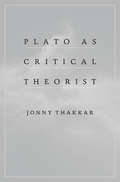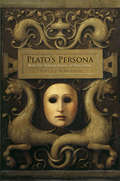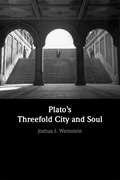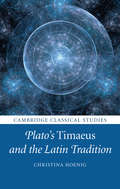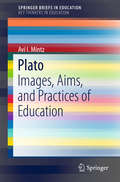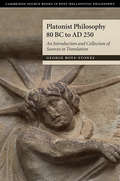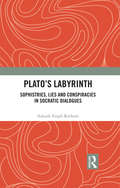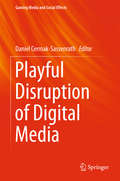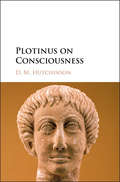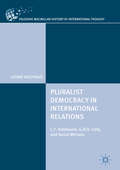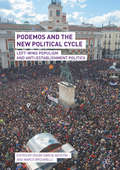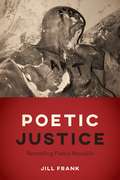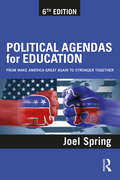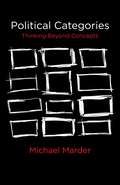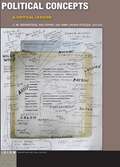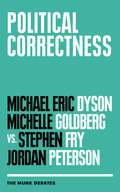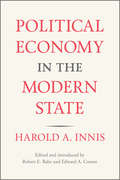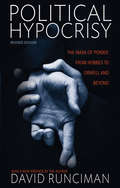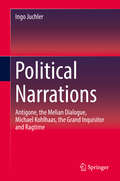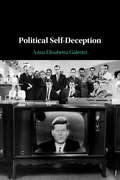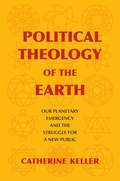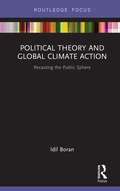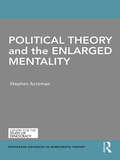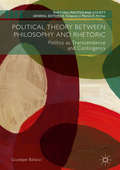- Table View
- List View
Plato and the Invention of Life
by Michael NaasThe question of life, Michael Naas argues, though rarely foregrounded by Plato, runs through and structures his thought. By characterizing being in terms of life, Plato in many of his later dialogues, including the Statesman, begins to discover—or, better, to invent—a notion of true or real life that would be opposed to all merely biological or animal life, a form of life that would be more valuable than everything we call life and every life that can actually be lived.This emphasis on life in the Platonic dialogues illuminates the structural relationship between many of Plato’s most time-honored distinctions, such as being and becoming, soul and body. At the same time, it helps to explain the enormous power and authority that Plato’s thought has exercised, for good or ill, over our entire philosophical and religious tradition.Lucid yet sophisticated, Naas’s account offers a fundamental rereading of what the concept of life entails, one that inflects a range of contemporary conversations, from biopolitics, to the new materialisms, to the place of the human within the living world.
Plato as Critical Theorist
by Jonny ThakkarWhat is the best possible society? How would its rulers govern and its citizens behave? Such questions are sometimes dismissed as distractions from genuine political problems, but in an era when political idealism seems a relic of the past, says Jonny Thakkar, they are more urgent than ever. A daring experiment in using ancient philosophy to breathe life into our political present, Plato as Critical Theorist takes seriously one of Plato’s central claims: that philosophers should rule. What many accounts miss is the intimate connection between Plato’s politics and his metaphysics, Thakkar argues. Philosophy is the activity of articulating how parts and wholes best fit together, while ruling is the activity that shapes the parts of society into a coherent whole conducive to the good life. Plato’s ideal society is thus one in which ideal theory itself plays a leading role. Today’s liberal democracies require not philosopher-kings legislating from above but philosopher-citizens willing to work toward a vision of the best society in their daily lives. Against the claim that such idealism is inherently illiberal, Thakkar shows that it is fully compatible with the liberal theories of both Popper and Rawls while nevertheless pushing beyond them in providing a new vantage point for the Marxian critique of capitalism.
Plato's Persona: Marsilio Ficino, Renaissance Humanism, and Platonic Traditions
by Denis J.-J. RobichaudIn 1484, humanist philosopher and theologian Marsilio Ficino published the first complete Latin translation of Plato's extant works. Students of Plato now had access to the entire range of the dialogues, which revealed to Renaissance audiences the rich ancient landscape of myths, allegories, philosophical arguments, etymologies, fragments of poetry, other works of philosophy, aspects of ancient pagan religious practices, concepts of mathematics and natural philosophy, and the dialogic nature of the Platonic corpus's interlocutors. By and large, Renaissance readers in the Latin West encountered Plato's text through Ficino's translations and interpretation.In Plato's Persona, Denis J.-J. Robichaud provides the first synthetic study of Ficino's interpretation of the Platonic corpus. Robichaud analyzes Plato's works in their original Greek and in Ficino's Latin translations, as well as Ficino's non-Platonic writings and correspondence, in the process uncovering new aspects of Ficino's intellectual work habits. In his letters and works, Ficino self-consciously imitated a Platonic style of prose, in effect devising a persona for himself as a Platonic philosopher. Plato's dialogues are populated with a wealth of literary characters with whom Plato interacts and against whom Plato refines his own philosophies. Reading through Ficino's translations, Robichaud finds that the Renaissance philosopher seeks an understanding of Plato's persona(e) among all the dialogues' interlocutors. In effect, Ficino assumed the role of Plato's Latin spokesperson in the Renaissance.Plato's Persona is grounded in an extensive study of scholarship in Renaissance humanism, classics, philosophy, and intellectual history, and contextualizes Ficino's intellectual achievements within the contemporary Christian orthodox view of Platonism. Ficino was an influential figure in the early Italian Renaissance: the key intermediary between Greek and Latin, and between manuscript and print, giving voice to Plato and access to the ancient frameworks needed to interpret his dialogues.
Plato's Threefold City and Soul
by Joshua I. WeinsteinPlato's 'Republic' constructs an ideal city composed of three parts, parallel to the soul's reason, appetites, and fighting spirit. But confusion and controversy have long surrounded this three-way division and especially the prominent role it assigns to angry and competitive spirit. In Plato's Three-fold City and Soul, Joshua I. Weinstein argues that, for Plato, determination and fortitude are not just expressions of our passionate or emotional natures, but also play an essential role in the rational agency of persons and polities. In the Republic's account, human life requires spirited courage as much as reasoned thought and nutritious food. The discussion ranges over Plato's explication of the logical and metaphysical foundations of justice and injustice, the failures of incomplete and dysfunctional cities, and the productive synergy of our tendencies and capacities that becomes fully evident only in the justice of a self-sufficient political community.
Plato's Timaeus and the Latin Tradition (Cambridge Classical Studies)
by Christina HoenigThis book focuses on the development of Platonic philosophy at the hands of Roman writers between the first century BCE and the early fifth century CE. It discusses the interpretation of Plato's Timaeus by Cicero, Apuleius, Calcidius, and Augustine, and examines how these authors created new contexts and settings for the intellectual heritage they received and thereby contributed to the construction of the complex and multifaceted genre of Roman Platonism. It takes advantage of the authors' treatment of Plato's Timaeus as a continuous point of reference to illustrate the individuality and originality of each writer in his engagement with this Greek philosophical text; each chooses a specific vocabulary, methodology, and literary setting for his appropriation of Timaean doctrine. The authors' contributions to the dialogue's history of transmission are shown to have enriched and prolonged the enduring significance of Plato's cosmology.
Plato: Images, Aims, And Practices Of Education (SpringerBriefs in Education)
by Avi I. MintzThis book opens by providing the historical context of Plato’s engagement with education, including an overview of Plato’s life as student and educator. The author organizes his discussion of education in the Platonic Corpus around Plato’s images, both the familiar – the cave, the gadfly, the torpedo fish, and the midwife – and the less familiar – the intellectual aviary, the wax tablet, and the kindled fire. These educational images reveal that, for Plato, philosophizing is inextricably linked to learning; that is, philosophy is fundamentally an educational endeavor. The book concludes by exploring Plato’s legacy in education, discussing the use of the “Socratic method” in schools and the Academy’s foundational place in the history of higher education. The characters in Plato’s dialogues often debate – sometimes with great passion – the purpose of education and the nature of learning. The claims about education in the Platonic corpus are so provocative, nuanced, insightful, and controversial that educational philosophers have reckoned with them for millennia.
Platonist Philosophy, 80 BC to AD 250 (Cambridge Source Books in Post-Hellenistic Philosophy): An Introduction and Collection of Sources in Translation
by George Boys-Stones'Middle' Platonism has some claim to be the single most influential philosophical movement of the last two thousand years, as the common background to 'Neoplatonism' and the early development of Christian theology. This book breaks with the tradition of considering it primarily in terms of its sources, instead putting its contemporary philosophical engagements front and centre to reconstruct its philosophical motivations and activity across the full range of its interests. The volume explores the ideas at the heart of Platonist philosophy in this period and includes a comprehensive selection of primary sources, a significant number of which appear in English translation for the first time, along with dedicated guides to the questions that have been, and might be, asked about the movement. The result is a tool intended to help bring the study of Middle Platonism into mainstream discussions of ancient philosophy. Provides a comprehensive collection of source-texts in English translation, which makes many of them accessible for the first time to a wide range of students and scholars. Covers the full range of philosophical interests and debates of 'Middle' Platonism, making the case for its philosophical importance. Sections of notes and further reading help the reader navigate the complexities of previous scholarship.
Plato’s Labyrinth: Sophistries, Lies and Conspiracies in Socratic Dialogues
by Aakash Singh RathoreThis original and stimulating study of Plato's Socratic dialogues rereads and reinterprets Plato's writings in terms of their dialogical or dramatic form. Taking inspiration from the techniques of Umberto Eco, Jacques Derrida, and Leo Strauss, Aakash Singh Rathore presents the Socratic dialogues as labyrinthine texts replete with sophistries and lies that mask behind them important philosophical and political conspiracies. Plato's Labyrinth argues that these conspiracies and intrigues are of manifold kinds – in some, Plato is masterminding the conspiracy; in others, Socrates, or the Sophists, are the victims of the conspiracies. With supplementary forays ('intermissions') into the world of Xenophon and the Sophists, the complex and evolving series of overlapping arguments that the book lays out unfold within an edgy and dramatic narrative. Presenting innovative readings of major texts – Plato's Parmenides, Republic, Symposium and Meno as also Homer's Odyssey – this work is an ambitious attempt to synthesize philological, political, historical and philosophical research into a classical text-centred study that is at once of urgent contemporary relevance. This book aims to revitalize the study of ancient Greek thought in all its diverse disciplinary richness and will interest students and scholars across the social sciences and humanities, especially those in philosophy, Greek and classical studies, language and literature, politics, media and culture studies, theatre and performance studies, and history.
Playful Disruption of Digital Media (Gaming Media and Social Effects Ser.)
by Daniel Cermak-SassenrathThis book starts with the proposition that digital media invite play and indeed need to be played by their everyday users. Play is probably one of the most visible and powerful ways to appropriate the digital world. The diverse, emerging practices of digital media appear to be essentially playful: Users are involved and active, produce form and content, spread, exchange and consume it, take risks, are conscious of their own goals and the possibilities of achieving them, are skilled and know how to acquire more skills. They share a perspective of can-do, a curiosity of what happens next? Play can be observed in social, economic, political, artistic, educational and criminal contexts and endeavours. It is employed as a (counter) strategy, for tacit or open resistance, as a method and productive practice, and something people do for fun.The book aims to define a particular contemporary attitude, a playful approach to media. It identifies some common ground and key principles in this novel terrain. Instead of looking at play and how it branches into different disciplines like business and education, the phenomenon of play in digital media is approached unconstrained by disciplinary boundaries. The contributions in this book provide a glimpse of a playful technological revolution that is a joyful celebration of possibilities that new media afford. This book is not a practical guide on how to hack a system or to pirate music, but provides critical insights into the unintended, artistic, fun, subversive, and sometimes dodgy applications of digital media.Contributions from Chris Crawford, Mathias Fuchs, Rilla Khaled, Sybille Lammes, Eva and Franco Mattes, Florian 'Floyd' Mueller, Michael Nitsche, Julian Oliver, and others cover and address topics such as reflective game design, identity and people's engagement in online media, conflicts and challenging opportunities for play, playing with cartographical interfaces, player-emergent production practices, the re-purposing of data, game creation as an educational approach, the ludification of society, the creation of meaning within and without play, the internalisation and subversion of roles through play, and the boundaries of play.
Plotinus on Consciousness
by D. M. HutchinsonPlotinus is the first Greek philosopher to hold a systematic theory of consciousness. The key feature of his theory is that it involves multiple layers of experience: different layers of consciousness occur in different levels of self. This layering of higher modes of consciousness on lower ones provides human beings with a rich experiential world and enables them to draw on their own experience to investigate their true self and the nature of reality. This involves a robust notion of subjectivity. However, it is a notion of subjectivity that is unique to Plotinus, and remarkably different from the post-Cartesian tradition. Behind the plurality of terms Plotinus uses to express consciousness, and behind the plurality of entities to which Plotinus attributes consciousness (such as the divine souls and the hypostases), lies a theory of human consciousness. It is a Platonist theory shaped by engagement with rival schools of ancient thought.
Pluralist Democracy in International Relations: L. T. Hobhouse, G. D. H. Cole, And David Mitrany (The\palgrave Macmillan History Of International Thought Ser.)
by Leonie HolthausThis book demonstrates the importance of democracy for understanding modern international relations and recovers the pluralist tradition of L.T. Hobhouse, G.D.H. Cole, and David Mitrany. It shows that pluralism’s typical interest in civil society, trade unionism, and transnationalism evolved as part of a wide-ranging democratic critique that representative democracies are hardly self-sustaining and are ill-equipped to represent all entitled social and political interests in international relations. Pluralist democratic peace theory advocates transnational loyalties to check nationalist sentiments and demands the functional representation of social and economic interests in international organizations. On the basis of the pluralist tradition, the book shows that theories about domestic democracy and international organizations co-evolved before scientific liberal democratic peace theory introduced new inside/outside distinctions.
Podemos and the New Political Cycle
by Óscar García Agustín Marco BriziarelliThis edited volume explores the context in which the Spanish party Podemos operates as both an agent and product of political cycles. It provides an account of the party's genealogy, ideological environment and relation to other political initiatives in Latin America and Western Europe. The contributors address the multiples dynamics generated by Podemos as a new party developed out of the economic crisis, the structural crisis concerning social democracy and the incarnation of the welfare state project, and, more generally, out of the Left. It will appeal to upper-level students and scholars interested in Spanish politics, history, culture and sociology.
Poetic Justice: Rereading Plato's "Republic"
by Jill FrankWhen Plato set his dialogs, written texts were disseminated primarily by performance and recitation. He wrote them, however, when literacy was expanding. Jill Frank argues that there are unique insights to be gained from appreciating Plato’s dialogs as written texts to be read and reread. At the center of these insights are two distinct ways of learning to read in the dialogs. One approach that appears in the Statesman, Sophist, and Protagoras, treats learning to read as a top-down affair, in which authoritative teachers lead students to true beliefs. Another, recommended by Socrates, encourages trial and error and the formation of beliefs based on students’ own fallible experiences. In all of these dialogs, learning to read is likened to coming to know or understand something. Given Plato’s repeated presentation of the analogy between reading and coming to know, what can these two approaches tell us about his dialogs’ representations of philosophy and politics? With Poetic Justice, Jill Frank overturns the conventional view that the Republic endorses a hierarchical ascent to knowledge and the authoritarian politics associated with that philosophy. When learning to read is understood as the passive absorption of a teacher’s beliefs, this reflects the account of Platonic philosophy as authoritative knowledge wielded by philosopher kings who ruled the ideal city. When we learn to read by way of the method Socrates introduces in the Republic, Frank argues, we are offered an education in ethical and political self-governance, one that prompts citizens to challenge all claims to authority, including those of philosophy.
Political Agendas for Education: From Make America Great Again to Stronger Together
by Joel SpringFollowing the epic, contentious 2016 presidential election, Joel Spring’s ongoing documentation and analysis of political agendas for education reflect the major political issues since 2012. Here he examines the 2016 education planks of the Republican, Democratic, Libertarian, and Green Parties, using their official platforms and other statements, speeches given by each candidate, and media reports and publications. Each party’s position is linked to previous political movements in education. Spring offers an alternative agenda for American schools, including a proposed education amendment to the U.S. Constitution and replacing human capital agendas with goals emphasizing education for a long life and happiness. Taking a fresh look at the social and political forces, educational research, and ideologies shaping their educational agendas and a comparative approach, the book stimulates reflection and discussion. Updates and changes in the Sixth Edition: Betsy DeVos’s education agenda supporting vouchers, free market competition and for-profit schools and its relationship to the education section of the 2016 Republican platform The important role religion and culture played in the evolution of Republican education policies after the school prayer and Bible decisions of the 1960s The influence of human capital economics on Democratic education proposals How No Child Left Behind and Democratic President Barack Obama opened doors to the growth of the for-profit education industry and investment bankers The 2016 Democratic positions on the cost of higher education and student loan debts The Democratic left as represented by the 2016 campaign of Democrat Bernie Sanders and his influence on the presidential candidate Hillary Clinton and the Democratic Party platform The education proposals of the Green and Libertarian parties
Political Categories: Thinking Beyond Concepts
by Michael MarderWestern philosophy has been dominated by the concept or the idea—the belief that there is one sovereign notion or singular principle that can make reality explicable and bring all that exists under its sway. In modern politics, this role is played by ideology. Left, right, or center, political schools of thought share a metaphysics of simplification. We internalize a dominant, largely unnoticeable framework, oblivious to complex, plural, and occasionally conflicting or mutually contradictory explanations for what is the case.In this groundbreaking work, Michael Marder proposes a new methodology for political science and philosophy, one which he terms “categorial thinking.” In contrast to the concept, no category alone can exhaust the meaning of anything: categories are so many folds, complications, respectful of multiplicity. Ranging from classical Aristotelian and Kantian philosophies to phenomenology and contemporary politics, Marder's book offers readers a theoretical toolbox for the interpretation of political phenomena, processes, institutions, and ideas. His categorial apparatus encompasses political temporality and spatiality; the revolutionary and conservative modalities of political actuality, possibility, and necessity; quantitative and qualitative approaches to the study of political reality; the meaning of political relations; and various senses of political being. Under this lens, the political appears not as a singular concept but as a family of categories, allowing room for new, plural, and often antagonistic ideas about the state, the people, sovereignty, and power.
Political Concepts: A Critical Lexicon (Idiom: Inventing Writing Theory)
by Ann Laura Stoler Adi M. OphirDeciding what is and what is not political is a fraught, perhaps intractably opaque matter. Just who decides the question; on what grounds; to what ends—these seem like properly political questions themselves. Deciding what is political and what is not can serve to contain and restrain struggles, make existing power relations at once self-evident and opaque, and blur the possibility of reimagining them differently. Political Concepts seeks to revive our common political vocabulary—both everyday and academic—and to do so critically. Its entries take the form of essays in which each contributor presents her or his own original reflection on a concept posed in the traditional Socratic question format “What is X?” and asks what sort of work a rethinking of that concept can do for us now.The explicitness of a radical questioning of this kind gives authors both the freedom and the authority to engage, intervene in, critique, and transform the conceptual terrain they have inherited. Each entry, either implicitly or explicitly, attempts to re-open the question “What is political thinking?” Each is an effort to reinvent political writing. In this setting the political as such may be understood as a property, a field of interest, a dimension of human existence, a set of practices, or a kind of event. Political Concepts does not stand upon a decided concept of the political but returns in practice and in concern to the question “What is the political?” by submitting the question to a field of plural contention.The concepts collected in Political Concepts are “Arche” (Stathis Gourgouris), “Blood” (Gil Anidjar), “Colony” (Ann Laura Stoler), “Concept” (Adi Ophir), “Constituent Power” (Andreas Kalyvas), “Development” (Gayatri Spivak), “Exploitation” (Étienne Balibar), “Federation” (Jean Cohen), “Identity” (Akeel Bilgrami), “Rule of Law” (J. M. Bernstein), “Sexual Difference” (Joan Copjec), and “Translation” (Jacques Lezra)
Political Correctness: The Munk Debates (The Munk Debates #2018)
by Stephen Fry Michelle Goldberg Michael Dyson Jordan PetersonThe twenty-second Munk Debate pits acclaimed journalist, professor, and ordained minister Michael Eric Dyson and New York Times columnist Michelle Goldberg against renowned actor and writer Stephen Fry and University of Toronto professor and author Jordan Peterson to debate the implications of political correctness and freedom of speech.Is political correctness an enemy of free speech, open debate, and the free exchange of ideas? Or, by confronting head-on the dominant power relationships and social norms that exclude marginalized groups are we creating a more equitable and just society? For some the argument is clear. Political correctness is stifling the free and open debate that fuels our democracy. It is also needlessly dividing one group from another and promoting social conflict. Others insist that creating public spaces and norms that give voice to previously marginalized groups broadens the scope of free speech. The drive towards inclusion over exclusion is essential to creating healthy, diverse societies in an era of rapid social change.
Political Economy in the Modern State
by Harold Innis Robert Babe Edward ComorPolitical Economy in the Modern State is Harold Innis’s transitional and, in some respects, his most transformative book. Completed in 1946, it is a collection of fifteen chapters plus a remarkable Preface selected and crafted to address four main themes: the problem of power and peace in the post-War era; the ascent of specialized and mechanized forms of knowledge involving, most particularly, the media, the state, and the academy; the crisis facing civilization and, more generally, the modern penchant for unreflexive short-term thinking in the face of mounting contradictions; and Innis’s growing focus on what would be called media bias.In this new edition, editors Robert E. Babe and Edward A. Comor provide not only a general introduction to Innis’s largely forgotten book but also dedicated introductions to each of its fifteen chapters and a comprehensive index. Together, Babe and Comor demonstrate how Innis’s volume reflects a shift in Innis’s focus, away from analytical relativism towards, instead, a reflexive search for objective truths.
Political Hypocrisy: The Mask of Power, from Hobbes to Orwell and Beyond, Revised Edition - Second Edition
by David RuncimanWhat kind of hypocrite should voters choose as their next leader? The question seems utterly cynical. But, as David Runciman suggests, it is actually much more cynical to pretend that politics can ever be completely sincere. Political Hypocrisy is a timely, and timeless, book on the problems of sincerity and truth in politics, and how we can deal with them without slipping into hypocrisy ourselves. Runciman draws on the work of some of the great truth-tellers in modern political thought--Hobbes, Mandeville, Jefferson, Bentham, Sidgwick, and Orwell--and applies his ideas to different kinds of hypocritical politicians from Oliver Cromwell to Hillary Clinton. He argues that we should accept hypocrisy as a fact of politics--the most dangerous form of political hypocrisy is to claim to have a politics without hypocrisy. Featuring a new foreword that takes the story up to Donald Trump, this book examines why, instead of vainly searching for authentic politicians, we should try to distinguish between harmless and harmful hypocrisies and worry only about the most damaging varieties.
Political Narrations: Antigone, The Melian Dialogue, Michael Kohlhaas, The Grand Inquisitor And Ragtime
by Ingo JuchlerThis book analyzes narrations embedded in political disputes, allowing readers to gain a deeper understanding of modern political reality. The author explores this theme in readings of the Sophocles tragedy Antigone, the Melian Dialogue of Thucydides, Heinrich von Kleist’s novella Michael Kohlhaas, Fyodor Dostoevsky's The Grand Inquisitor and E.L. Doctorow’s Ragtime novel, taking into account the relevant interdisciplinary aspects of the narratives. His study of these four narrations focuses on key political concepts, such as might and right, self-interest, legality and justice, the nation-state and democracy, and relates them compellingly to current actuality. Since narrations can exert comprehensive and lasting influence on individuals’ political discernment, this systematic analysis allows for a better comprehension of politics in education and civics.
Political Self-Deception
by Anna Elisabetta GaleottiSelf-deception, that is the distortion of reality against the available evidence and according to one's wishes, represents a distinctive component in the wide realm of political deception. It has received relatively little attention but is well worth examining for its explanatory and normative dimensions. In this book Elisabetta Galeotti shows how self-deception can explain political occurrences where public deception intertwines with political failure – from bad decisions based on false beliefs, through the self-serving nature of those beliefs, to the deception of the public as a by-product of a leader's self-deception. Her discussion uses close analysis of three well-known case studies: John F. Kennedy and the Cuba Crisis, Lyndon B. Johnson and the Gulf of Tonkin Resolution, and George W. Bush and the Weapons of Mass Destruction. Her book will appeal to a range of readers in political philosophy, political theory, and international relations.
Political Theology of the Earth: Our Planetary Emergency and the Struggle for a New Public (Insurrections: Critical Studies in Religion, Politics, and Culture)
by Catherine KellerAmid melting glaciers, rising waters, and spreading droughts, Earth has ceased to tolerate our pretense of mastery over it. But how can we confront climate change when political crises keep exploding in the present? Noted ecotheologian and feminist philosopher of religion Catherine Keller reads the feedback loop of political and ecological depredation as secularized apocalypse. Carl Schmitt’s political theology of the sovereign exception sheds light on present ideological warfare; racial, ethnic, economic, and sexual conflict; and hubristic anthropocentrism. If the politics of exceptionalism are theological in origin, she asks, should we not enlist the world’s religious communities as part of the resistance?Keller calls for dissolving the opposition between the religious and the secular in favor of a broad planetary movement for social and ecological justice. When we are confronted by populist, authoritarian right wings founded on white male Christian supremacism, we can counter with a messianically charged, often unspoken theology of the now-moment, calling for a complex new public. Such a political theology of the earth activates the world’s entangled populations, joined in solidarity and committed to revolutionary solutions to the entwined crises of the Anthropocene.
Political Theory and Global Climate Action: Recasting the Public Sphere (Routledge Focus on Philosophy)
by Idil BoranFrom around the world, cities and regions, civil society networks and businesses, nongovernmental organizations and institutions for research and learning, and many others, are taking action on climate change. The role of these nonstate and substate actors is increasingly being recognized in the new facilitative climate regime. Political theory to date has been surprisingly silent about the scale and prospects of these actions for low-carbon, climate-resilient, and sustainable transformations. Idil Boran argues provocatively for the need for a widened scope of vision, one that has a broader public life of climate action at its centre. While acknowledging the role of the state and the multilateral process, Boran maintains that social transformation is as deeply and more continuously influenced by the engagement of a wide range of actors below and above the state, whose actions are often locally anchored and inescapably interwoven across borders. Bringing concepts of the public sphere from political theory into contact with leading scholarship on transnational climate governance, Political Theory and Global Climate Action launches an exploration sensitive to changing patterns of practice, focused on diversity of actors, driven to explore historically contingent conditions of possibility, and responsive to questions of equity and justice in the context of transformations. The result is a repositioning of political thought on climate change, engaging political philosophers, scholars of politics and governance, and drivers of climate action worldwide at nonstate and substate levels interested in the social and political meaning of their engagement.
Political Theory and the Enlarged Mentality (Routledge Advances in Democratic Theory)
by Stephen AcremanIn this book, Stephen Acreman follows the development and reception of a hitherto under-analyzed concept central to modern and postmodern political theory: the Kantian ein erweiterte Denkungsart, or enlarged mentality. While the enlarged mentality plays a major role in a number of key texts underpinning contemporary democratic theory, including works by Arendt, Gadamer, Habermas, and Lyotard, this is the first in-depth study of the concept encompassing and bringing together its full range of expressions. A number of attempts to place the enlarged mentality at the service of particular ideals–the politics of empathy, of consensus, of agonistic contest, or of moral righteousness–are challenged and redirected. In its exploration of the enlarged mentality, the book asks what it means to assume a properly political stance, and, in giving as the answer ‘facing reality together’, it uncovers a political theory attentive to the facts and events that concern us, and uniquely well suited to the ecological politics of our time.
Political Theory between Philosophy and Rhetoric
by Giuseppe BallacciThis book explores the significance of rhetoric from the perspective of its complex relationship with philosophy. It demonstrates how this relationship gives expression to a basic tension at the core of politics: that between the contingency of its happening and the transcendence toward which it strives. The first part of the study proposes a reassessment of the ancient quarrel between philosophy and rhetoric, as it was discussed by Plato, Aristotle, and above all Cicero and Quintilian, who ambitiously attempted to bring them together creating an ideal that is at the roots of the humanist tradition. It then moves to twentieth-century political theory and shows how the questions that emerge from that quarrel still strongly resonate in the works of key thinkers such as H. Arendt, L. Strauss, and R. Rorty. The volume thus offers an original contribution that locates itself at the intersection of politics, rhetoric, and philosophy.

